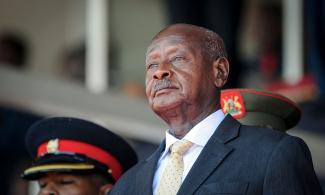
In January 2021, the Ugandan government ordered an internet shutdown on the eve of the presidential election.
Premier regional bar association for East Africa, the East African Law Society, has instituted a reference before the East African Court of Justice challenging the legality of the actions of the Ugandan Government in restricting its citizens’ and residents’ access to the internet during the last elections.
In January 2021, the Ugandan government ordered an internet shutdown on the eve of the presidential election.

The East African nation lifted the blackout more than 100 hours after imposing it the day before the January 14 elections.
Authorities apologised for the inconvenience and said the shutdown was to avoid outside interference in the election, which long-time leader Yoweri Museveni was declared to have won against popular singer-turned-politician, Bobi Wine.
But on Friday, the East African Law Society, in a statement signed by its president, Bernard Oundo, described the action as 'worrying'.
According to the legal practitioners, such an action was a growing trend of mass censorship and intolerance to dissent within the member states of the East African Community.
The group stated that the government of Uganda followed in the footsteps of the governments of Tanzania and Burundi that had similarly blocked access to major social media networks during their October and May 2020 general elections respectively.
The group stated that the restrictions and shutdowns are unlawful, as it violates every important body of law including the Treaty for the Establishment of the East African Community, international human rights law, and even the domestic laws of the affected countries.
Part of the release read, “In consideration of its mandate to promote and enhance the rule of law, good governance, and respect for human rights across the East African Community, the East Africa Law Society (“EALS”) has today, the 12th day of March 2021, instituted a Reference before the East African Court of Justice challenging the legality of the actions of the Government of the Republic of Uganda in restricting its citizens’ and residents’ access to the internet.
“On 13th January 2021, the Government of Uganda imposed a total internet shutdown within Uganda. Before that, it had also blocked access to social media networking platforms and over 100 Virtual Private Networks. The actions of the Government of Uganda followed in the footsteps of the Governments of Tanzania and Burundi that had similarly blocked access to major social media networks during their October and May 2020 general elections respectively.
“Such actions are part of a worrying and growing trend of mass censorship and intolerance to dissent within the member states of the East African Community (“EAC”). The restrictions and shutdowns are unlawful. They violate every important body of law including the Treaty for the Establishment of the East African Community, international human rights law, and even the domestic laws of the affected countries.
“They impermissibly limit, among others, the peoples’ rights to internet access, freedom of access to information, freedom of speech and expression, freedom of the press, the right to freely participate in the affairs of one’s government, freedom of association, freedom of assembly, the right to self-determination, and economic rights.
“The restrictions are also a violation of the obligation of EAC state governments to abide by the principles of good governance, democracy, the rule of law, public accountability and transparency, and social justice. If not addressed in time and checked, the rising trend of internet censorship in East Africa will only deepen and cement further.”
The group also stated that the reference is filed against the Attorney General of Uganda and the Secretary-General of the East African Community.
It said the reference is also to get compensation for the immense inconvenience and loss suffered by Ugandan citizens, residents, and businesses during the internet shutdown while compelling the Government of Uganda to legal and other reforms in place, to avoid a repeat of the situation.
The release added: “The Reference that the EALS has filed is against both the Attorney General of Uganda and the Secretary-General of the EAC. Within it, the EALS not only seeks declarations that the Government of Uganda violated the law, but also seeks compensation for the immense inconvenience and loss suffered by many Ugandan citizens, residents, and businesses.
“The Reference also seeks a structural interdict compelling the Government of Uganda to put in place legal and other reforms, under the Court’s supervision, to ensure that a repeat of the challenged violations does not occur. We hope that the Reference will serve as a deterrent for EAC member states and send the message that illegal actions will not be ignored or taken lightly.
“We call upon the peoples of the EAC and Civil Society Organisations to remain vigilant in holding the governments of East Africa accountable so that together, we can make the EAC a law-abiding Community. One people one destiny.”